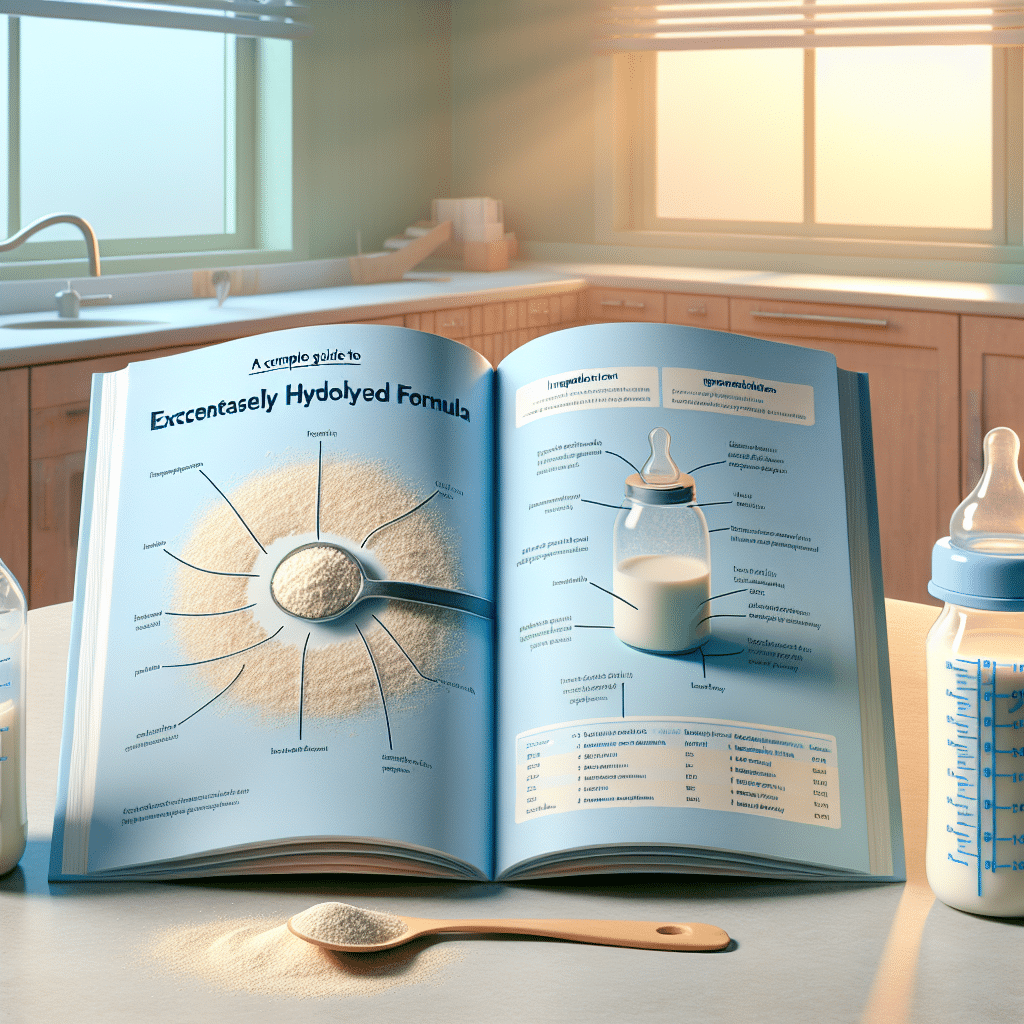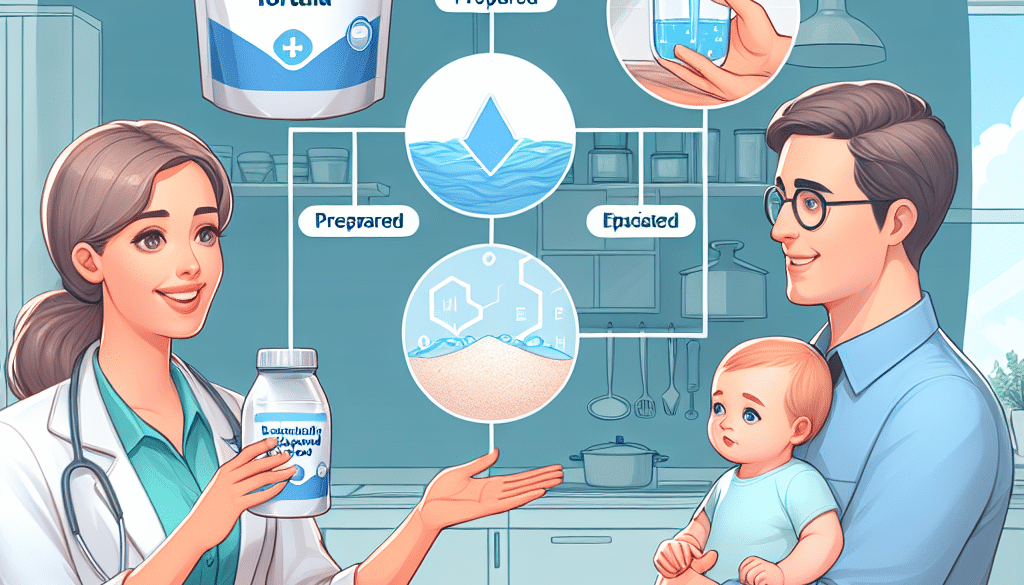Extensively Hydrolysed Formula: A Complete Guide
-
Table of Contents
- Extensively Hydrolysed Formula: A Comprehensive Guide for Parents and Caregivers
- Understanding Extensively Hydrolysed Formula
- How Extensively Hydrolysed Formulas Are Made
- The Difference Between Partially and Extensively Hydrolysed Formulas
- Benefits of Extensively Hydrolysed Formula
- When Is Extensively Hydrolysed Formula Necessary?
- Choosing the Right Extensively Hydrolysed Formula
- Case Studies and Examples
- Transitioning to Extensively Hydrolysed Formula
- Managing Cost and Accessibility
- Conclusion: Key Takeaways on Extensively Hydrolysed Formulas
- Recommendation: ETprotein’s High-Quality Protein Products
Extensively Hydrolysed Formula: A Comprehensive Guide for Parents and Caregivers

When it comes to infant nutrition, breast milk is widely recognized as the optimal source of nourishment for babies. However, for various reasons, some infants may require alternative forms of nutrition. Extensively hydrolysed formulas (EHFs) are one such alternative, designed for babies who cannot tolerate cow’s milk protein or have specific medical conditions. This comprehensive guide will delve into what extensively hydrolysed formula is, its benefits, when it’s necessary, and how to choose the right one for your child.
Understanding Extensively Hydrolysed Formula
Extensively hydrolysed formulas are a type of hypoallergenic infant formula designed to be easier to digest and less likely to cause allergic reactions in babies with cow’s milk protein allergy (CMPA) or other food sensitivities. The proteins in these formulas are broken down into smaller pieces, called peptides, which are less likely to trigger an immune response.
How Extensively Hydrolysed Formulas Are Made
The process of creating an EHF involves breaking down the proteins in cow’s milk using enzymes. This hydrolysis process reduces the proteins to such small sizes that the immune system of a baby with CMPA is less likely to recognize them as allergens. The degree of hydrolysis can vary, but EHFs are characterized by having the proteins broken down extensively.
The Difference Between Partially and Extensively Hydrolysed Formulas
It’s important to distinguish between partially hydrolysed formulas (PHFs) and EHFs. PHFs have proteins that are only partially broken down and may still cause allergic reactions in some infants. EHFs, on the other hand, are suitable for babies with diagnosed CMPA because the proteins are broken down to a greater extent.
Benefits of Extensively Hydrolysed Formula
EHFs offer several benefits for infants who require them:
- Reduced Allergenicity: The extensive hydrolysis process significantly reduces the risk of allergic reactions in susceptible infants.
- Improved Digestibility: Smaller protein fragments are easier for a baby’s immature digestive system to handle.
- Support for Special Medical Conditions: EHFs can be crucial for managing conditions like eosinophilic esophagitis or food protein-induced enterocolitis syndrome (FPIES).
When Is Extensively Hydrolysed Formula Necessary?
EHFs are typically recommended for babies with:
- Cow’s milk protein allergy (CMPA)
- Multiple food protein allergies
- Certain gastrointestinal conditions
- A family history of allergies, when breastfeeding is not possible
It’s essential to consult with a pediatrician or allergist before starting an EHF, as they can help diagnose CMPA and guide you through the process of selecting and using the formula.
Choosing the Right Extensively Hydrolysed Formula
When selecting an EHF for your baby, consider the following factors:
- Medical Advice: Always choose an EHF based on a healthcare professional’s recommendation.
- Formula Composition: Look for formulas that meet complete nutritional needs and are fortified with essential vitamins and minerals.
- Brand Reputation: Opt for formulas from reputable manufacturers with a proven track record of quality and safety.
Case Studies and Examples
Several studies have demonstrated the effectiveness of EHFs in managing CMPA and other conditions. For instance, a randomized controlled trial published in the Journal of Allergy and Clinical Immunology found that infants with CMPA who were fed an EHF showed significant improvement in symptoms compared to those fed a non-hydrolysed formula.
Transitioning to Extensively Hydrolysed Formula
Transitioning to an EHF can be challenging for some infants, especially if they are used to the taste of breast milk or a standard formula. Here are some tips to make the transition smoother:
- Gradually mix the EHF with the previous formula or breast milk, slowly increasing the proportion of EHF.
- Be patient, as it may take time for your baby to adjust to the new taste and texture.
- Monitor your baby’s reaction to the formula and consult with your pediatrician if you notice any adverse effects.
Managing Cost and Accessibility
EHFs can be more expensive than standard formulas, which may be a concern for some families. To manage the cost:
- Check if your insurance plan covers EHFs, especially if prescribed for a medical condition.
- Look for assistance programs offered by formula manufacturers or local organizations.
- Discuss with your pediatrician the possibility of transitioning to a less expensive formula once your baby’s condition improves.
Conclusion: Key Takeaways on Extensively Hydrolysed Formulas
Extensively hydrolysed formulas are a vital option for infants with CMPA or other special dietary needs. They provide a safe and effective alternative to breast milk and standard formulas, ensuring that affected babies receive the nutrition they need without risking allergic reactions. When choosing an EHF, it’s crucial to work closely with healthcare professionals to find the most suitable product for your child’s specific needs.
Recommendation: ETprotein’s High-Quality Protein Products
If you’re looking for high-quality protein products, consider ETprotein’s offerings. Their extensive range of organic and plant-based proteins, including rice, pea, pumpkin seed, and sunflower seed proteins, cater to various industries and dietary requirements. ETprotein’s commitment to non-GMO, allergen-free products makes them a reliable choice for those seeking alternative protein sources.
About ETprotein:
ETprotein, a reputable protein Chinese factory manufacturer and supplier, is renowned for producing, stocking, exporting, and delivering the highest quality organic bulk vegan protein and plant proteins. They include Organic rice protein, clear rice protein, pea protein, clear pea protein, pumpkin seed protein, sunflower seed protein, mung bean protein, etc. Their offerings, characterized by a neutral taste, non-GMO, allergen-free attributes, cater to a diverse range of industries. They serve nutraceutical, pharmaceutical, cosmeceutical, veterinary, as well as food and beverage finished product distributors, traders, and manufacturers across Europe, USA, Canada, Australia, Thailand, Japan, Korea, Brazil, and Chile, among others.
ETprotein specialization includes exporting and delivering tailor-made protein powder and finished nutritional supplements. Their extensive product range covers sectors like Food and Beverage, Sports Nutrition, Weight Management, Dietary Supplements, Health and Wellness Products, and Infant Formula, ensuring comprehensive solutions to meet all your protein needs.
As a trusted company by leading global food and beverage brands and Fortune 500 companies, ETprotein reinforces China’s reputation in the global arena. For more information or to sample their products, please contact them and email sales(at)ETprotein.com today.












